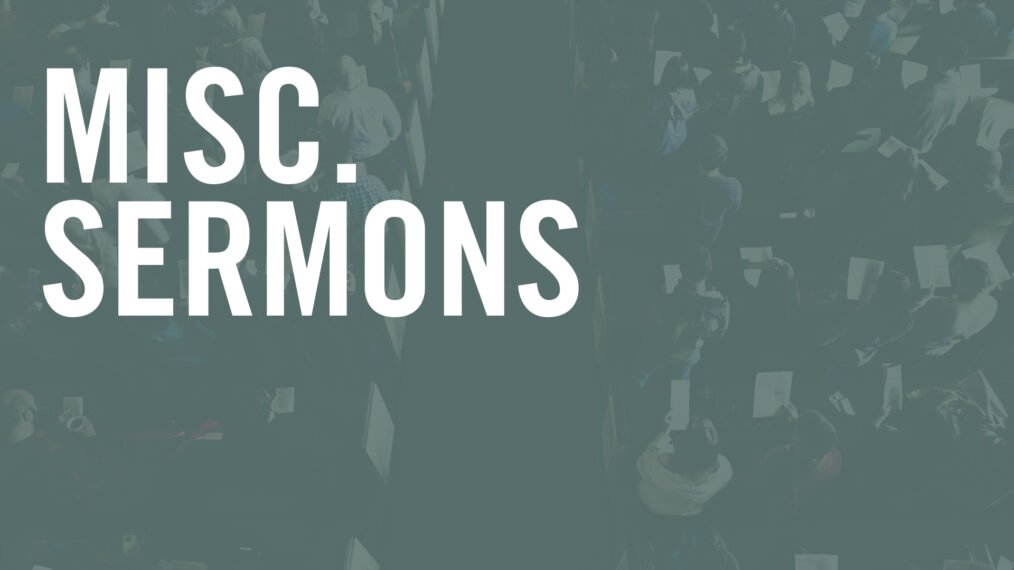This Sunday is Pentecost Sunday, where we remember the sending of the promised Holy Spirit. The Spirit is still among us, empowering God’s people. As we celebrate this day, we do so as people still living in its present reality!
This is also week 14 of Matthew, and the final week of Part One of the series. We’ll discuss Jesus & Integrity this week, then turn our attention to the Psalms for the remainder of the summer, returning to Matthew Part Two in the fall.
Here’s how you can prepare for this Sunday:
1. Read our text, Matthew 5:33–37.
Jesus’ teaching on oaths might seem foreign or even irrelevant to modern readers, but the deeper issue He is addressing is something common to us all. The practice of swearing oaths by a significant person or object was common practice in first century Judaism. It was similar to the practice of swearing by the Bible, but it was used much more widely in their society with a complex set of customs and regulations.
The main issue is that people were using something outside of themselves to try to bolster their reputation or perceived trustworthiness. Jesus is pushing them away from this cultural form of manipulation and toward integrity and honest communication. In our culture, people use things like exaggeration, embellishment, spin, or deception to control or improve their image in any given relationship or scenario. Jesus is saying that this desire to distort reality is not God’s way. It comes from a place of insecurity, and it cultivates deeper isolation and distrust that damages relationships and communities. God’s people can be honest about reality, even when the truth is unpleasant, knowing that Jesus—who already knows our blemishes, failures, weaknesses, and insecurities—still loves us and welcomes us into His Kingdom.
2. Read, pray, and sing through the service:
Don’t have Spotify? Click the song title below to see song on YouTube.
CALL TO WORSHIP: Based on Acts 2:17–21:
“God will pour out the Spirit on all flesh,
and our daughters and sons shall prophesy.
Our old ones shall dream dreams,
and our young ones shall see visions,
and all who call upon the name of the Lord shall be delivered.”
Come, let us call upon the name of the Lord.
Fall Afresh (Jeremy Riddle)
CONFESSION OF SIN: From The Worship Sourcebook:
Gracious God,
You have given us the law of Moses and the teachings of Jesus
to direct us in the way of life.
You offer us Your Holy Spirit
so that we can be born to new life as your children.
Yet, O God, we confess that the ways of death have a strong attraction and that we often succumb to their lure.
Give us the vision and courage to choose and nurture life,
that we may receive Your blessing. Amen.
ASSURANCE OF PARDON: 1 Corinthians 1:20–22
Doxology (Amen) (Bourgeois, Ken, Owens, Wickham addl. verses JD Raab)
PASSING THE PEACE
(Click to Read)
When we’ve met as a large group on Sundays, we’ve always had a time of greeting one another after singing. Many churches call this time “passing the peace.” In some church traditions, one person will say to another, “The peace of Christ be with you” to which the other person responds, “And also with you.”
While potentially unfamiliar for some, we felt that “passing the peace” during greeting times at home could be a powerful act in this age marked by very little external peace. In Isaiah 9, Jesus is described as the Prince of Peace. He wants His kingdom to be marked by this very peace! We want to “pass” to one another this peace that only Jesus can give, especially at a time like this.
It might feel a bit cheesy, but we encourage you to actually pray the peace of God over each other during our times. We encourage you to look into each other’s eyes as you say, “The peace of Christ be with you!” and have others respond with, “And also with you.” Be open-hearted to Jesus, asking Him to fill you with His peace.
SERMON & COMMUNION
Who You Say I Am (Ben Fielding, Reuben Morgan)
BENEDICTION
It’s Matthew week 14 at Park Church. We’ll continue in the Sermon on the Mount, discussing Jesus and marriage.
Two weeks from now, we begin Christ in the Psalms, our annual summer series. Starting many summers ago, we’ve been going week-by-week, Psalm-by-Psalm, taking them in order from Psalm 1. We’ll start this year’s Christ in the Psalms with a little bit of a milestone—Psalm 100.
As for this Sunday, here’s how you can prepare!
1. Read our text, Matthew 5:31–32.
For many reasons, the topic of divorce is both sensitive and complex, and this instruction from Jesus is not intended to be a comprehensive teaching on the matter. Jesus’ teaching assumes that people understand the Biblical design for marriage—that marriage is to be a lifelong covenant relationship that reflects the faithful and enduring love of God for His people. At the same time, Jesus’ teachings on divorce reflect an understanding of the brokenness in our world by permitting—but not encouraging—divorce in certain scenarios related to infidelity.
The focus of this particular teaching is to confront those who were taking marriage vows lightly. People were distorting Old Testament teachings to justify divorce for almost any reason. Jesus is challenging the people of His Kingdom toward something better: to radically honor and uphold God’s design for marriage as a lifelong covenant relationship so that they might reflect the radical beauty of God’s covenant love for His people.
2. Read, pray, and sing through the service:
Don’t have Spotify? Click the song title below to see song on YouTube.
CALL TO WORSHIP: Psalm 8:1, 3–4
How Majestic (Brian Eichelberger)
CONFESSION OF SIN: From The Worship Sourcebook:
O gracious and gentle and condescending God,
God of peace, Father of mercy, God of all comfort:
we confess before You the evil of our hearts;
we acknowledge that we are too inclined
toward anger, jealousy, and revenge,
to ambition and pride,
which often give rise to discord and bitter feelings
between others and us.
Too often have we thus both offended and grieved You,
O long-suffering Father.
Forgive us this sin and allow us to enjoy
the blessing you have promised the peacemakers,
who shall be called the children of God.
Through Jesus Christ, our Lord. Amen.
ASSURANCE OF PARDON: 1 Peter 1:3–4
Living Hope (Brian Johnson, Phil Wickham)
PASSING THE PEACE
(Click to Read)
When we’ve met as a large group on Sundays, we’ve always had a time of greeting one another after singing. Many churches call this time “passing the peace.” In some church traditions, one person will say to another, “The peace of Christ be with you” to which the other person responds, “And also with you.”
While potentially unfamiliar for some, we felt that “passing the peace” during greeting times at home could be a powerful act in this age marked by very little external peace. In Isaiah 9, Jesus is described as the Prince of Peace. He wants His kingdom to be marked by this very peace! We want to “pass” to one another this peace that only Jesus can give, especially at a time like this.
It might feel a bit cheesy, but we encourage you to actually pray the peace of God over each other during our times. We encourage you to look into each other’s eyes as you say, “The peace of Christ be with you!” and have others respond with, “And also with you.” Be open-hearted to Jesus, asking Him to fill you with His peace.
SERMON & COMMUNION
Yes And Amen (Anthony Brown, Chris McClarney, Nate Moore)
The Blessing (Chris Brown, Cody Carnes, Kari Jobe, and Steven Furtick)
BENEDICTION
We’re back to the book of Matthew for week 13 of our the series, continuing in the Sermon on the Mount.
We’re also still in the season of Eastertide, the “Great Fifty Days” between Lent and Pentecost. If you’re saying to yourself, “I still don’t know what Eastertide is!”, visit The Christian Year, our artistic accompaniment to the church calendar, for a short explanation and some music, art, and written prayer for the season.
A note for parents in regards to this Sunday’s content:
This week we discuss Jesus and the topic of lust. If your children have not been introduced to the subjects and realities of sexuality, lust, or pornography, consider being prepared in advance of this week’s sermon to have them set up with some other resources for learning and worship. Here is this week’s Kids’ Sunday Worship page!
Here’s how you can prepare for this Sunday:
1. Read our text, Matthew 5:27–30.
Even with the shifting ethics in American culture, marital unfaithfulness is still generally discouraged. Lust, however, is considered virtually unavoidable. For this culture—and for the original audience—Jesus’ teaching about lust is both radical and incisive. He takes the seventh commandment, “do not commit adultery,” and addresses the deeper heart issue behind it. To lust after someone who is not your spouse is to commit adultery in your heart. Jesus treats this with extreme gravity, using hyperbolic images to prescribe radical measures for eliminating such a destructive sin. Here again, Jesus is trying to show His people that moral conformity and behavioral modification is an inadequate path to the flourishing life that He wants for His people.
However, the command itself has no power to transform the human heart. Jesus alone can transform bent hearts. He alone can wash away shame. He alone can give the power to pursue a life of purity, faithfulness, and love.
2. Read, pray, and sing through the service:
Don’t have Spotify? Click the song title below to see song on YouTube.
CALL TO WORSHIP: Psalm 145:8–10
Take A Moment (Will Reagan)
Way Maker (Osinachi Kalu Okoro Egbu)
CONFESSION OF SIN: Psalm 51:1–3, 9–10
ASSURANCE OF PARDON: 1 John 1:7–9
All Hail King Jesus (Gretzinger, Jackson, Mattis, Riddle) / Glory Be To God The Father (Horatius Bonar, Joel Limpic)
PASSING THE PEACE
(Click to Read)
When we’ve met as a large group on Sundays, we’ve always had a time of greeting one another after singing. Many churches call this time “passing the peace.” In some church traditions, one person will say to another, “The peace of Christ be with you” to which the other person responds, “And also with you.”
While potentially unfamiliar for some, we felt that “passing the peace” during greeting times at home could be a powerful act in this age marked by very little external peace. In Isaiah 9, Jesus is described as the Prince of Peace. He wants His kingdom to be marked by this very peace! We want to “pass” to one another this peace that only Jesus can give, especially at a time like this.
It might feel a bit cheesy, but we encourage you to actually pray the peace of God over each other during our times. We encourage you to look into each other’s eyes as you say, “The peace of Christ be with you!” and have others respond with, “And also with you.” Be open-hearted to Jesus, asking Him to fill you with His peace.
SERMON & COMMUNION
His Mercy Is More (Matt Boswell, Matt Papa)
BENEDICTION
Podcast: Play in new window | Download


